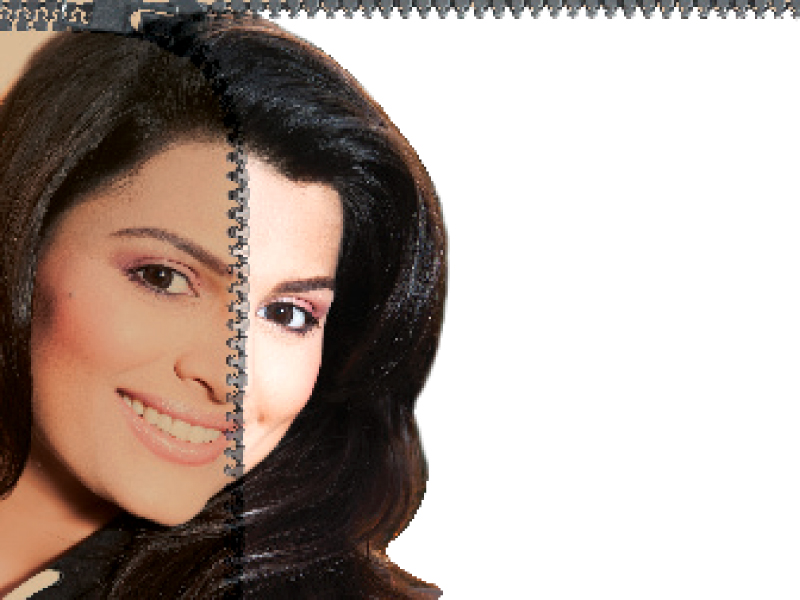
Sahar Ahmed was 13 years old when she first started smoking. A decade of chain smoking later, her face showed signs of the toxicity that nicotine and tar bequeath: dark lips, spotty skin and pigmentation around the lips. But all this changed when she accompanied her mother to Dental Cosmetologist Dr Tania Shaikh’s office for a check-up three months ago.
“When Dr Shaikh saw me, she told me she could give me something that would fix everything.” The treatment that followed helped her not only with the skin pigmentation but, according to her, also her drug and smoking addictions and unremitting insomnia.
She was thus introduced to intravenous glutathione injections, the latest instalment in skin whitening procedures on offer at Karachi’s most popular skin clinics. While this practice gained popularity in the US and the Philippines in 2007, it came to Pakistan a little over a year and a half ago.
“My mission is to help patients battle pigmentation,” says Dr Shaikh who works at Dr Afzal Lodhi’s Clinic and is an advocate for this method. “After a few shots, I can see the skin of my patients lightening. Their dark spots fade away.”
She explains that the injections – which are a cocktail of glutathione, Vitamin C and collagen – start taking effect after a few sessions, with one being administered per visit. And if a patient wants a full-body change, IV or intravenous shots are given over a span of a few months. They range from between 10 and 20 depending on how light a patient wants their skin to become.
But Ahmed says her reason for taking these shots was not to lighten her skin. “I told Dr Shaikh that I don’t want to become ‘white’. She promised me that I wouldn’t but that it would help my body detox and also get rid of pigmentation and marks.” Ahmed is now into 10 sessions and her skin, in her own words, is “clear and glowing”. She also sleeps without needing medication and has stopped smoking cigarettes or hash. “My lips are back to being pink,” she declared.
The treatment is popular. “A considerable majority of patients interested in skin whitening formulae opts for glutathione injections – even men,” says Shaikh. She explains that they are sold by distributors within the range of Rs4,000 to Rs7,000, with cheaper varieties also available. “It is important to avoid very cheap brands that could cause harm,” she adds. “Going to the right practitioner and monitoring dosage is also vital.” Glutathione can be taken orally, but the best results are seen when it is given as an intravenous drip. Patients who do not want to attain overall fairness can opt for mesotherapy, in which the shots are administered to dark areas of the face. Mesotherapy only targets facial melanocyte [melanin-producing cells]; it will not affect other parts of the body.
Patients should know, however, that it is not permanent treatment, since even after the sessions are complete, patients may have to get maintenance shots every few months. “It’s transient therapy,” explains cosmetologist Dr Badr Dhanani, who also prescribes glutathione to his patients. “Nothing can make one permanently white. If there were such a thing, then the president of America would be white – it’s every dark person’s desire.”

While he says he does not “push” these shots and therapies on patients because he considers himself a conservative doctor, he will write a prescription if the patients want it. “It’s not a very clandestine procedure – with a prescription, you can go to any hospital and get it,” he adds.
While the US Food and Drug Administration confirmed to The Express Tribune that it has not approved glutathione injections for skin whitening, Dr Dhanani says there is nothing to be afraid of. “It works wonders for a few months. So far, the reports are in its favour, saying it is effective and good.”
*Patient and client names have been changed to protect privacy.
The need to be gora
“They may not speak about it at first, but it is every woman’s dream,” maintains Dr Naqiba Munshi of Element Medispa. “They all want to be fair.” Dr Munshi also offers glutathione injections at her clinic, but says that they are not given to everyone. “People equate fairness with beauty, and feel that they will get better marriage proposals if they have blemish-free, fair skin. They will do anything to have that and we want to control that obsession,” she says. According to her, the majority of patients who come for skin-whitening procedures are women, with some as young as 18 years old. Also, mothers are active in demanding the treatment for their daughters, as the perception is that a fairer complexion can result in a better future for them.
Glutathione – the mother of all anti-oxidants
Hailed by medical experts as the mother of all anti-oxidants, glutathione is a molecule that is naturally present in the human body. But due to poor diet, stress, trauma, medication and a host of other reasons, this life-giving molecule (pronounced “gloota-thigh-own”) is depleted and cannot be recycled if the toxic load in our blood stream is too high. Doctors say that the primary reason why this molecule is critical is because it recycles anti-oxidants which help protect our bodies against infections, cancer and toxins. Not only does this molecule act as a detoxifying agent, it also helps strengthen the body’s immune system and is important in fighting chronic illnesses.
In a report published in the Huffington Post, physician Mark Hyman, MD described glutathione as “the master detoxifier and maestro of the immune system”.
Who should not take this treatment
While most doctors say that controlled amounts of glutathione injections are not harmful, patients should disclose their medical history before getting a dose.
• People with heart, liver and kidney conditions should not opt for glutathione shots as it could lead to complications such as kidney failure and sinus tachycardia.
• Blood sugar levels must be monitored after the shot is administered, and the patient should avoid being in the sun for a few days.
• High doses of glutathione given to patients with hypersensitive skin may result in the life-threatening Stevens Johnson syndrome.
• Vitiligo patients should not receive glutathione injections for skin whitening.
• Pregnant women and those who are breastfeeding should not opt for glutathione injections.
According to an AFP report published in 2011, the Food and Drug Association in the Philippines warned that repeated injections of the drug could lead to kidney failure, blood poisoning and toxic epidermal necrolysis, in which a large portion of the skin peels off, exposing the human body to many infections.
Published in The Express Tribune, February 6th, 2013.
COMMENTS (19)
Comments are moderated and generally will be posted if they are on-topic and not abusive.
For more information, please see our Comments FAQ


1672385156-0/Andrew-Tate-(1)1672385156-0-165x106.webp)














@Hasan: This is not cheap They are just giving an information
I don't think that the US President wants to be white which just shows how confused some doctors can be. I think that the dark skin obsession is more of an issue in Karachi because a lot of people there migrated from India and colour is a big issue in India as part of their castism. People in Pakistan, especially in Upper Punjab, KPK, Northern Areas, Kashmir and Baluchistan are naturally lighter than most people in other parts of South Asia including India, Sri Lanka and Bangladesh but they don't dwell on skin colour. I have a brother in law who is Urdu speaking from Karachi and his family originates in UP; He is so concertned about sun exposure that he always wears a hat but my Punjabi relatives don't care about a little sun at all even though their fair skin is more likely to get sunburned! I don't think we should generalize a trend from India to Pakistanis who are more comfortable with their skin tones.
"“Nothing can make one permanently white. If there were such a thing, then the president of America would be white – it’s every dark person’s desire.” Barrack Obama seems to be proud of his colour - he apparently has no desire to be white. Muhammad Ali boxer and Martin Luther King never wanted to be white. Even among ladies there are many who have no desire to be white.
Its more about grass-is-greener-at-the-other-side. Here in UK, "gori" girls almost bake themselves in tanning saloons to get color in the skin, and they always envy our complexion(as mentioned by many of my colleagues), while "apni" girls put 10 layers of base then go out to look in lighter skin. I'm surely not a representative of all the guys in the world, but personally, I hate make up, its a turn off for me. Nothing beats a natural healthy skin, and looks much more attractive then faces with loads of different "clown" colors. And I'm not sure what kinda guys want to go out with girl, who wont be recognizable easily next morning when she washes her face? Girls get pressurized not only from media, but from each other also. I wont mind if girls go for normal makeup, but start hating your own complexion, and in that pursuit ruining it, is step to far. Honestly girls, I love girls with tan complexion, and there are loads of guys like me in the world, don't heed guys who doesn't want you way you were born, go out with us!..(just kidding) :) :)
I am a Pakistani lady and I am not "gora". I have a dark complexion and I am happy with it. And while it may be news to some women obsessed with the " gora rang" to acclaim a 'better future' I am married to a man and am also employed at a reputed work place. At least up till this point in time i have not been discriminated against either at home or at work based on my complexion.
Strangely, white people want to become a bit darker, several tanning studios in West; moral Nobody is content with what he/she got.
It's depressing to see how racist the Pakistani mindset is becoming, where dark people are ostracised, and pressured by their own family and friends to become white. It seems eventually there will be no dark people left in Pakistan and also in India where this racial cleansing occurs.
Compare all this to England, where white people want to become dark, or 'tanned' as they call it, by 'sunbathing' (sitting in the sun all day) or going to 'tanning salons' where they sit in an ultra violet light sunbed, or have a dark liquid sprayed all over the body. Having a tan is actually seen as higher status in England, as people beleive that a tanned person can afford to go on more overseas trips to hot countries to sunbathe, as there is relatively less sunlight in England.
A mad world we live in!
Isn't it the same treatment that caused the death of Michael Jakson.
“It’s transient therapy,” explains cosmetologist Dr Badr Dhanani, who also prescribes glutathione to his patients. “Nothing can make one permanently white. If there were such a thing, then the president of America would be white – it’s every dark person’s desire.”
....WHAT?!?!
I am brownish and not even once I desired to have fair skin.I dont care.I had my share of 'racist' remarks. Surprisingly they were from my own family and friends and not from people belonging to other races. Stop all this nonsense. Instead, try home remedies like lemon juice or besan pack.They are at least safe (even if they dont work as effectively ).
Can't wait for some guy who seeks a 'gori' bride to later find out he's been duped. Would be priceless!
Dr Dhanani's comment about the US pres is hilarious! (not a compliment) An insight into the sorry minds of many, but amusing nevertheless,
White imperialism seeps into our skin.
Mirror mirror on the wall I wish I was the fairest of them all. See you soon Dr. Tania!
@Billoo Bhaya: Well said brother... I'm glad people realize this, hopefully this culture will get better with time
Im wheatish and never in my life have I asked God why He didnt make me fair, or desired it for myself.. nopes Im very happy... and give a rats behind to gora rang ;)
Please stop providing cheap publicity to these sham medical practitioners in the guise of journalism. Really pathetic
Ours is a world gone mad. My wife looks like other Pakistanis, not a Ghori. But her heart and mind are the two best things I am blessed with. And everyday she makes it heavenly to be alive. That's what counts in life, not detox etc., Illusions are harbinger of unhappiness.